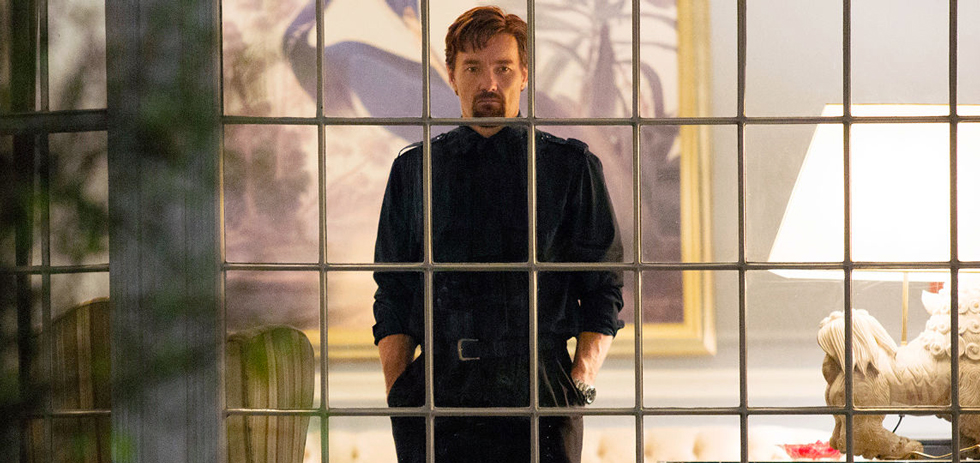
For a film with a title like The Gift, Joel Edgerton’s directorial debut feels more like a rushed trip to the shops pre-birthday celebrations, rather than a well planned and crafted surprise. The structural issues alone are unexpected, given not only the overwhelmingly positive reception from American critics and audiences, but also Edgerton’s impressive work with Sydney-based film collective Blue-Tongue Films. What could have been a feature-length equivalent to his brutal and funny short film work is instead a run-of-the-mill, detached psychological thriller that relies upon social stigma for its inherent terror, and does a disservice to its female protagonist in the process.
The film opens on couple Simon (Jason Bateman) and Robyn (Rebecca Hall) in the process to Los Angeles from Chicago following a miscarriage. Simon hungrily seeks a promotion at his new job, and Robyn attempts to recuperate in their stylish yet isolated home in the hills. After an awkward encounter with Simon’s old school friend Gordo (Edgerton) while out shopping, the couple invite him over for dinner. As becomes quickly apparent, Simon’s dismissive attitude towards Gordo has a mysterious backstory, painting the array of unusual and chillingly devoted gifts from Gordo in a new light. The undisclosed history between Gordo and Simon unravels when Robyn begins to investigate – cue a series of two-dimensional supporting characters that exist solely to provide exposition and half-hearted red herrings.
The Gift loses its focus as it strives to stay unpredictable and subvert the tropes of the thriller. Admittedly, it’s difficult to elucidate what that actually means without spoiling the plot. Nevertheless, in general terms: Edgerton (here a triple-threat director/star/writer) warps the story until nothing is recognisable, yet neither is it affecting. Initially, the film opts for a traditional, gradual build-up of unease, though a build-up punctuated by simple jump scares. Progressively, both Simon and Gordo become increasingly murky figures and Robyn remains the audience’s emotional lynchpin, the story’s moral compass, though these simply rendered characters never move too far beyond vague archetypes.
The constant shifts between characters’ statuses as either ‘good’ or ‘bad’ – the film doesn’t really entertain a more nuanced perspective beyond this simplistic binary – leave us bereft of emotion. The notion that the supposed source of malice may not be the actual threat after all is hardly revolutionary in a psychological thriller, but the film barely permits itself enough time to explore this idea in a novel way before reverting back to its original dynamic. In limiting our ability to sink our teeth into any plot revelations, the film’s ending lacks the emphasis and intensity one would expect from such a sudden shift. Rather than opt for unease established through genuinely unsettling character dynamics, Edgerton’s characters are cheaply characterised by broad and blunt swipes taken at complex social issues. That’s not to say the film’s narrative beats aren’t all disappointing – there’s a late bait-and-switch that was especially impressive.
For a film seemingly anchored around the perception of its lead female character, it’s surprising that Rebecca Hall’s Robyn so poorly utilised, reduced to a pawn in a man’s game, simply fueling conflict between Simon and Gordo. The plot toys with her sympathies to Gordo relative to her husband’s but, on the whole, she’s largely denied autonomy until the film’s ending, by which point the gesture is utterly fruitless. In a visual sense, Hall is reduced to repetitious tracking shots of her out running on empty suburban streets, and close-ups of her breathlessly peering around corners.
Hall thankfully manages to breathe life into the character of Robyn. Her on-screen presence is full of warmth, compassion, integrity, and an emotional understatement that often plays off nicely against the aggression and dominance asserted by Jason Bateman’s Simon. Where the script may let her character down, Hall manages to perform what she has been given in such a way that somewhat counteracts her character’s overall lack of agency. Bateman himself aptly plays the role of the ‘alpha male’, reminding us of his ability to take on dramatic roles as well, if not quite with the same deftness as his comedic ones. Delivering a disquieting wide-eyed stare, Edgerton seems at home, too, in the role of the resident creep. He’s no stranger to darker, grittier roles (Felony, Crossbow, etc.) and simultaneously injects an edge of mingled pity and discomfort to each scene.
That noted, the film’s true misstep lies with its final twist, one meant to devastate and terrify both the audience and its characters. What this turns out to be sends a particularly clear message about the way The Gift poorly prioritises its characters, lazily opting for a cheap gutpunch that truly relegates Robyn to the sidelines. The film signals its narrative as one about male pride and insecurity, a well-worn (and fairly dull) thematic idea that we’re supposed to empathise with in some way. Instead, the ending is both poorly conceived and poorly executed, undoing much of the genuine unease the film had crafted up until that point.
As a staple of the Australian filmmaking scene, Edgerton has been involved in several skilfully-crafted films over the last decade. There’s no doubt of his calibre, both on-screen and as a writer, but The Gift not only fails to demonstrate his impressive understanding of narrative beats but also disappoints as his first foray behind the camera.
Around the Staff:
| Felix Hubble | |
| Ian Barr | |
| Conor Bateman | |
| Imogen Gardam | |
| Luke Goodsell |
